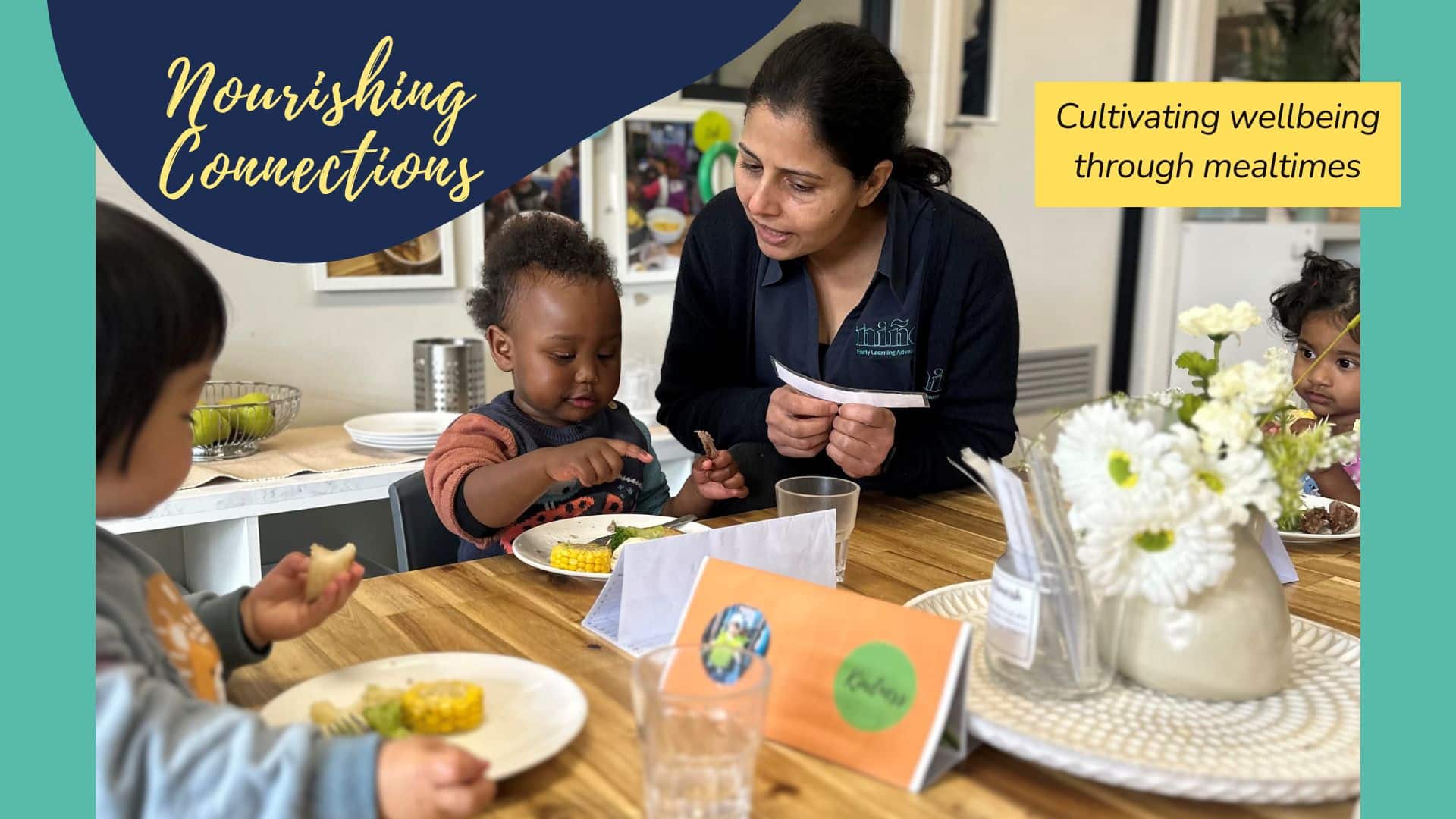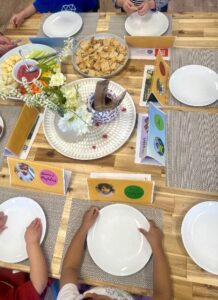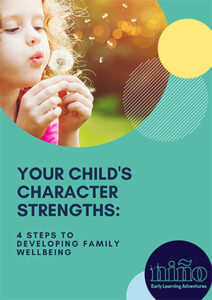Nourishing Connections – Cultivating Family Wellbeing Through Positive Mealtimes

In the bustling juggle of daily life, mealtimes often become just another task on the to-do list. However, it has been well documented that gathering for a shared meal can bring a sense of wellbeing and foster social connection. This sense of community and connection during meals has been found to have positive effects on mental and emotional wellbeing, as well as promoting healthier food choices.
At Niño ELA, mealtimes are always about more than just the nutritious and delicious food we serve. We thought we would share some of our guiding principles on Positive Mealtimes, along with some tips for families to incorporate at home.
Shared mealtimes, whether with immediate or extended family or friends, can offer rich opportunities to promote positive outcomes for children; opportunities to support children’s learning, development, health and wellbeing. Sharing a meal together is a wonderful way to cultivate and build relationships and for children to engage in meaningful conversations. Positive mealtimes also lay the foundation for healthy eating habits that can last a lifetime.
Key Highlights of Positive Mealtimes
Nutritional Benefits: Numerous studies have shown that children who eat regular meals with their families are more likely to have healthier dietary patterns. Research published in the Journal of Paediatrics (2008) indicates that family meals are associated with higher consumption of fruits, vegetables, wholegrains and calcium-rich foods, leading to better overall nutrition.
Social Development: Mealtimes serve as natural social contexts where children learn vital social skills. A longitudinal study published in Child Development (2002) found that regular family meals during childhood were associated with better social outcomes in adolescence, including higher levels of communication and emotional wellbeing.
Emotional Wellbeing: Sharing meals with family members fosters a sense of belonging and emotional security for children. It also impacts boundaries and expectations, along with learning, positive values, social competencies, and positive identity.
Language Development: Conversation around the dinner table provides a valuable opportunity for language development in young children. Research suggests that mealtime conversation promotes language skills such as vocabulary acquisition, syntax development, and narrative ability, laying the groundwork to support academic pursuits later in life.
Tips to make mealtimes a more enriching experience for your family
Consistency: Where possible, establish a regular mealtime routine and stick to it as much as possible. Consistency provides a sense of structure and predictability, which is comforting for young children.
Set the Scene: Set the stage for positive mealtimes by creating
Encourage Conversation: Spark meaningful dialogue by asking open-ended questions and actively listening to your children’s responses. Use mealtimes as an opportunity to learn more about their interests, dreams, and concerns.
Lead by example: Children learn by observing, so be mindful of your own eating behaviours and attitudes towards food. Model healthy eating habits and positive body image, and refrain from using mealtimes as a battleground for more emotionally charged conversations and debates.
Conversation Starters
Meaningful open-ended conversations are a great way to support children to express themselves and flourish in
their positive relationships, positive emotions and positive health, and promote meaningful and reciprocal conversations. Responsive and meaningful interactions build trust and support children to feel secure, confident and included.
Conversations with young children support their development in speech and language skills, along with their listening skills. At Niño ELA, conversation starters support the language of Positive Education, encouraging children to talk about themselves and the character strengths they have demonstrated. We always have conversation starters available in all the Centres to support positive conversations. Here are some you might like to try at home:
• Tell us about a time you were brave…
• Tell us about how you were kind to someone today…
• Tell us about a time when someone was kind to you…
• If you could have any superpower, what would it be and how would you use it?
• What is something that you have been working really hard on?
• What are you grateful for today?
• What’s something new you learned recently?
• Has something funny happened today that you would like to share with us?
• What is one kind thing that you are going to do for someone else today?
• What was the best part of your day today?
If you have little ones who are still learning to take turns when they talk, you can try using a ‘talking stick’ or something the person talking holds to demonstrate who is talking. This could be a rock or a toy. It can be a good visual prompt for siblings to see who is speaking, and good practice for turn-taking too!
In the jigsaw puzzle of life and fitting in work, play, activities and just, life… it is not always possible to create the space and time to share a meal. However, we hope by illuminating the myriad of benefits of positive mealtimes might just spark a few more dinner table conversations and memorable moments!
Bon appétit!
Dr Lauren Burns
Dr Lauren Burns (PhD) is an Olympic gold medallist and a leading nutritionist who shares our passion for building healthy eating habits for life.
Learn more about Niño ELA’s Nutrition Program »
In the bustling juggle of daily life, mealtimes often become just another task on the to-do list. However, it has been well documented that gathering for a shared meal can bring a sense of wellbeing and foster social connection. This sense of community and connection during meals has been found to have positive effects on mental and emotional wellbeing, as well as promoting healthier food choices.
At Niño ELA, mealtimes are always about more than just the nutritious and delicious food we serve. We thought we would share some of our guiding principles on Positive Mealtimes, along with some tips for families to incorporate at home.
Shared mealtimes whether with immediate or extended family or friends, can offer rich opportunities to promote positive outcomes for children. Opportunities to support children's learning, development, health and wellbeing. Sharing a meal together is a wonderful way to cultivate and build relationships and for children to engage in meaningful conversations. Positive mealtimes also lay the foundation for healthy eating habits that can last a lifetime.
Key Highlights of Positive Mealtimes
Nutritional Benefits: Numerous studies have shown that children who eat regular meals with their families are more likely to have healthier dietary patterns. Research published in the Journal of Paediatrics (2008) indicates that family meals are associated with higher consumption of fruits, vegetables, wholegrains and calcium-rich foods, leading to better overall nutrition.
Social Development: Mealtimes serve as natural social contexts where children learn vital social skills. A longitudinal study published in Child Development (2002) found that regular family meals during childhood were associated with better social outcomes in adolescence, including higher levels of communication and emotional well-being.
Emotional Wellbeing: Sharing meals with family members fosters a sense of belonging and emotional security for children. It also impacts boundaries and expectations, along with learning, positive values, social competencies, and positive identity.
Language Development: Conversation around the dinner table provides a valuable opportunity for language development in young children. Research suggests that mealtime conversation promotes language skills such as vocabulary acquisition, syntax development, and narrative ability, laying the groundwork to support academic pursuits later in life.
Tips to make mealtimes a more enriching experience for your family
Consistency: Where possible, establish a regular mealtime routine and stick to it as much as possible. Consistency provides a sense of structure and predictability, which is comforting for young children.
Set the Scene: Set the stage for positive mealtimes by creating a pleasant atmosphere free from distractions. Turn off electronic devices, and have the children set the table. Getting the kids involved in setting the table can provide a sense of purpose and readiness for all coming together for a meal.
Encourage Conversation: Spark meaningful dialogue by asking open-ended questions and actively listening to your children's responses. Use mealtimes as an opportunity to learn more about their interests, dreams, and concerns.
Lead by example: Children learn by observing, so be mindful of your own eating behaviours and attitudes towards food. Model healthy eating habits and positive body image, and refrain from using mealtimes as a battleground for more emotionally charged conversations and debates.
Conversation Starters
Meaningful open-ended conversations are a great way to support children to express themselves and flourish in their positive relationships, positive emotions and positive health and promote meaningful and reciprocal conversations. Responsive and meaningful interactions build trust and support children to feel secure, confident and included.
Conversations with young children support their development in speech and language skills, along with their listening skills. At Niño ELA, conversation starters support the language of Positive Education, encouraging children to talk about themselves and the character strengths they have demonstrated. We always have conversation starters available in all the Centres to support positive conversations. Here are some you might like to try at home:
• Tell us about a time you were brave…
• Tell us about how you were kind to someone today…
• Tell us about a time when someone was kind to you…
• If you could have any superpower, what would it be and how would you use it?
• What is something that you have been working really hard on?
• What are you grateful for today?
• What's something new you learned recently?
• Has something funny happened today that you would like to share with us?
• What is one kind thing that you are going to do for someone else today?
• What was the best part of your day today?
If you have little ones who are still learning to take turns when they talk, you can try using a 'talking stick' or something the person talking holds to demonstrate who is talking. This could be a rock or a toy. It can be a good visual prompt for siblings to see who is speaking, and good practice for turn-taking too!
In the jigsaw puzzle of life and fitting in work, play, activities and just, life… it is not always possible to create the space and time to share a meal. However, we hope by illuminating the myriad of benefits of positive mealtimes might just spark a few more dinner table conversations and memorable moments!
Bon appétit!
Dr Lauren Burns
Dr Lauren Burns (PhD) is Niño ELA's Nutritional Ambassador, an Olympic gold medallist and a leading nutritionist who shares our passion for building healthy eating habits for life.
Learn more about Niño ELA's Nutrition Program »
In the bustling juggle of daily life, mealtimes often become just another task on the to-do list. However, it has been well documented that gathering for a shared meal can bring a sense of wellbeing and foster social connection. This sense of community and connection during meals has been found to have positive effects on mental and emotional wellbeing, as well as promoting healthier food choices.
At Niño ELA, mealtimes are always about more than just the nutritious and delicious food we serve. We thought we would share some of our guiding principles on Positive Mealtimes, along with some tips for families to incorporate at home.
Shared mealtimes whether with immediate or extended family or friends, can offer rich opportunities to promote positive outcomes for children. Opportunities to support children’s learning, development, health and wellbeing. Sharing a meal together is a wonderful way to cultivate and build relationships and for children to engage in meaningful conversations. Positive mealtimes also lay the foundation for healthy eating habits that can last a lifetime.
Key Highlights of Positive Mealtimes
Nutritional Benefits: Numerous studies have shown that children who eat regular meals with their families are more likely to have healthier dietary patterns. Research published in the Journal of Paediatrics (2008) indicates that family meals are associated with higher consumption of fruits, vegetables, wholegrains and calcium-rich foods, leading to better overall nutrition.
Social Development: Mealtimes serve as natural social contexts where children learn vital social skills. A longitudinal study published in Child Development (2002) found that regular family meals during childhood were associated with better social outcomes in adolescence, including higher levels of communication and emotional well-being.
Emotional Wellbeing: Sharing meals with family members fosters a sense of belonging and emotional security for children. It also impacts boundaries and expectations, along with learning, positive values, social competencies, and positive identity.
Language Development: Conversation around the dinner table provides a valuable opportunity for language development in young children. Research suggests that mealtime conversation promotes language skills such as vocabulary acquisition, syntax development, and narrative ability, laying the groundwork to support academic pursuits later in life.
Tips to make mealtimes a more enriching experience for your family
Consistency: Where possible, establish a regular mealtime routine and stick to it as much as possible. Consistency provides a sense of structure and predictability, which is comforting for young children.
Set the Scene: Set the stage for positive mealtimes by creating a pleasant atmosphere free from distractions. Turn off electronic devices, and have the children set the table. Getting the kids involved in setting the table can provide a sense of purpose and readiness for all coming together for a meal.
Encourage Conversation: Spark meaningful dialogue by asking open-ended questions and actively listening to your children’s responses. Use mealtimes as an opportunity to learn more about their interests, dreams, and concerns.
Lead by example: Children learn by observing, so be mindful of your own eating behaviours and attitudes towards food. Model healthy eating habits and positive body image, and refrain from using mealtimes as a battleground for more emotionally charged conversations and debates.
Conversation Starters
Meaningful open-ended conversations are a great way to support children to express themselves and flourish in their positive relationships, positive emotions and positive health and promote meaningful and reciprocal conversations. Responsive and meaningful interactions build trust and support children to feel secure, confident and included.
Conversations with young children support their development in speech and language skills, along with their listening skills. At Niño, conversation starters support the language of Positive Education, encouraging children to talk about themselves and the character strengths they have demonstrated. We always have conversation starters available in all the Centres to support positive conversations. Here are some you might like to
In the bustling juggle of daily life, mealtimes often become just another task on the to-do list. However, it has been well documented that gathering for a shared meal can bring a sense of wellbeing and foster social connection. This sense of community and connection during meals has been found to have positive effects on mental and emotional wellbeing, as well as promoting healthier food choices.
At Niño ELA, mealtimes are always about more than just the nutritious and delicious food we serve. We thought we would share some of our guiding principles on Positive Mealtimes, along with some tips for families to incorporate at home.
Shared mealtimes whether with immediate or extended family or friends, can offer rich opportunities to promote positive outcomes for children. Opportunities to support children’s learning, development, health and wellbeing. Sharing a meal together is a wonderful way to cultivate and build relationships and for children to engage in meaningful conversations. Positive mealtimes also lay the foundation for healthy eating habits that can last a lifetime.
Key Highlights of Positive Mealtimes
Nutritional Benefits: Numerous studies have shown that children who eat regular meals with their families are more likely to have healthier dietary patterns. Research published in the Journal of Paediatrics (2008) indicates that family meals are associated with higher consumption of fruits, vegetables, wholegrains and calcium-rich foods, leading to better overall nutrition.
Social Development: Mealtimes serve as natural social contexts where children learn vital social skills. A longitudinal study published in Child Development (2002) found that regular family meals during childhood were associated with better social outcomes in adolescence, including higher levels of communication and emotional wellbeing.
Emotional Wellbeing: Sharing meals with family members fosters a sense of belonging and emotional security for children. It also impacts boundaries and expectations, along with learning, positive values, social competencies, and positive identity.
Language Development: Conversation around the dinner table provides a valuable opportunity for language development in young children. Research suggests that mealtime conversation promotes language skills such as vocabulary acquisition, syntax development, and narrative ability, laying the groundwork to support academic pursuits later in life.
Tips to make mealtimes a more enriching experience for your family
Consistency: Where possible, establish a regular mealtime routine and stick to it as much as possible. Consistency provides a sense of structure and predictability, which is comforting for young children.

Encourage Conversation: Spark meaningful dialogue by asking open-ended questions and actively listening to your children’s responses. Use mealtimes as an opportunity to learn more about their interests, dreams and concerns.
Lead by example: Children learn by observing, so be mindful of your own eating behaviours and attitudes towards food. Model healthy eating habits and positive body image, and refrain from using mealtimes as a battleground for more emotionally charged conversations and debates.
Conversation Starters
Meaningful open-ended conversations are a great way to support children to express themselves and flourish in their positive relationships, positive emotions and positive health, and promote meaningful and reciprocal conversations. Responsive and meaningful interactions build trust and support children to feel secure, confident and included.

• Tell us about a time you were brave…
• Tell us about how you were kind to someone today…
• Tell us about a time when someone was kind to you…
• If you could have any superpower, what would it be and how would you use it?
• What is something that you have been working really hard on?
• What are you grateful for today?
• What’s something new you learned recently?
• Has something funny happened today that you would like to share with us?
• What is one kind thing that you are going to do for someone else today?
• What was the best part of your day today?
If you have little ones who are still learning to take turns when they talk, you can try using a ‘talking stick’ or something the person talking holds to demonstrate who is talking. This could be a rock or a toy. It can be a good visual prompt for siblings to see who is speaking, and good practice for turn-taking too!
In the jigsaw puzzle of life and fitting in work, play, activities and just, life… it is not always possible to create the space and time to share a meal. However, we hope by illuminating the myriad of benefits of positive mealtimes might just spark a few more dinner table conversations and memorable moments!
Bon appétit!
Dr Lauren Burns
__________________________________________________________________
Dr Lauren Burns (PhD) is an Olympic gold medallist and a leading nutritionist who shares our passion for building healthy eating habits for life.
Learn more about Niño ELA’s Nutrition Program »

